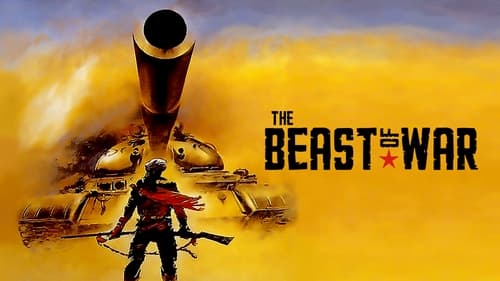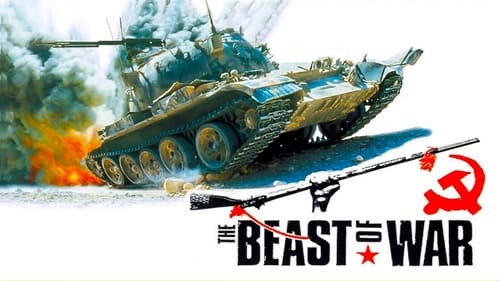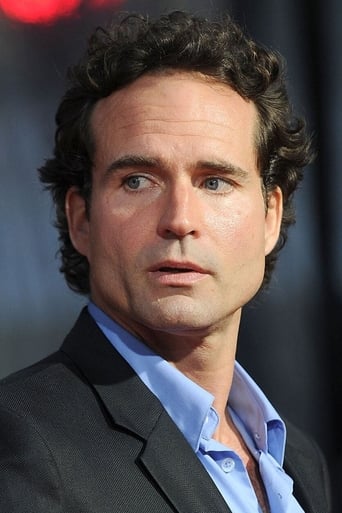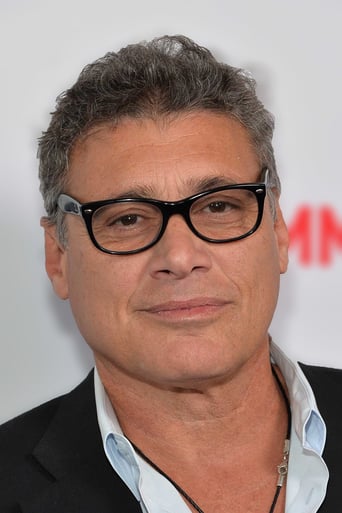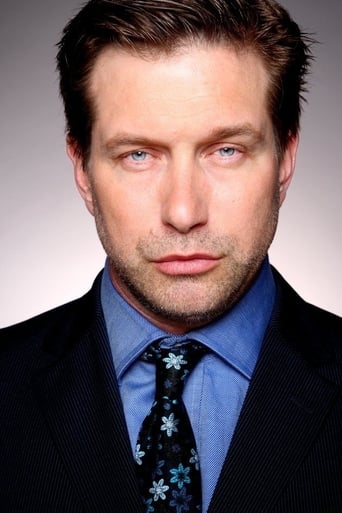pesic-1
It would look kind of like this. The plot is moronic, the characters ridiculous and superficial, and the action is straight out of the fantasy of a bunch of schoolboys. I won't even call this pathological anti-Russian propaganda, because it's too dumb to even qualify as such. There is no attempt to make anything in this film even remotely believable, and one every so often finds himself wondering whether or not this is a parody. This thing is so silly, it makes Rambo 3 look like a serious war drama. So let's address the plot in brief. The Soviets decide to annihilate a tiny village (a few houses and a mosque) in the middle of nowhere. Why? No reason. Not only do they blow up every house, but the mosque, too. Then they kill all the livestock and poison the well, for no apparent reason. Now, the task force consists of three tanks. Why? Why not land a team with helicopters, get the job done, and then fly them back? Why would tanks be driving around the desert with no air cover and no infantry protection? Why would tank crews leave the tanks and start exchanging fire with the rebels? What if they get killed? Who's gonna operate the tank?
This is the kind of stupidity that is seen in one scene after the other. Characters act like idiots, they do one dumb thing after another, and finally a helicopter arrives to save the crew of a tank that's lost in the desert and pursued by the rebels. So what happens? The ENTIRE crew of the helicopter: pilot, copilot, gunner, engineer... drinks from a pond nearby and gets poisoned by the poison the Soviet army had previously dumped there. Now, wouldn't they have known about the poison? Would they have drunk from a filthy pond filled with bacteria and parasites of every description? Wouldn't they have prioritized rescuing their men to collectively filling their stomachs with bog water? And how did a tank get lost anyway? In this film every scene and every action taken by the protagonists makes you wonder how it was humanly possible to write something that dumb. That being said, had I seen this at the age of nine, I would have just enjoyed the brainless action. But that fact hardly saves this film from being a colossal failure. It's an embarrassment. Zero stars.
aamirmushtaque
an underrated gem.deserves at least an 8 on IMDb.greatest achievement of the film is to allow us to empathize with the afghans as well as the Russian soldiers ,although we know that Russia has the negative image here.also we get to understand the pathetic condition of the Afghanistan.apart from these achievements as a movie also the film entertains and thrills you to the core with its awesome climax.definitely in my top 10 war movies of all time along with Tae gukji, My way,spr, Platoon, Full metal jacket, Deer hunter, Cross of iron, Letters from iwo jima and The thin red line .definitely a 10 out of 10 for me.
tieman64
"Systems exist so we never meet each other." - Mr. Lif This is a review of "Rambo 3", "The Living Daylights" and "The Beast", three action movies from the late 1980s, now interesting for the way in which they toe the Pentagon line regarding Afghanistan's Mujahideen.The best of the three films, "Rambo 3" stars Sylvester Stallone as a Vietnam veteran who lives in a monastery, looks depressed, pumps iron and wears a mullet. Though now a pacifist, Rambo nevertheless returns for "one last job". His old Colonel has been kidnapped by evil Soviets forces and is being imprisoned in a super cool looking military base deep within the heart of Afghanistan. Rambo's mission? Get in, kick ass, get out. As he's essentially a giant walking penis, Rambo severely overcompensates. Not only does he rescue his buddy, but he kicks Russia out of Afghanistan, rallies a band of friendly Mujahideen freedom fighters, teaches locals to love Westerners and schools us all in the evils of communism. The film ends with a title card praising the brave heroes of the Mujahideen."The Living Daylights" tells the same tale, though here our hero is British Secret Agent James Bond (Timothy Dalton). Less homo-erotic than Stallone's film, but equally patriotic, "Daylights" opens with various totems of Britannia - the Rock of Gibraltar, Union Jacks, Harrier jets - before nosediving into a plot about defecting Russians, Afghan opium and evil commies. Once again the film ends with Mujahideen on horseback charging valiantly toward Soviet Forces. The Empires of the West – and their lovable henchmen, Bond and Rambo - love underdog freedom fighters, see.Less cartoonish but more fascist, "The Beast" revolves around a Soviet tank crew. They rape and pillage Afghan villages, blow up mosques, their racist, tyrannical leader is shown to hate even pro-communist Afghan allies, and our hero is an enlightened Russian who defects and joins forces with the Mujahideen to once again, like Rambo, charge headlong into Soviet tanks and helicopters.In all these films, the Mujahideen are portrayed as civilised, well educated freedom fighters pitted against remorseless, uncouth Soviet monsters. What's hilarious is that as soon as the Soviet Union collapses, cinema immediately starts portraying the Mujahideen as villains; they're now of no use. They're US public enemy number 1.In 1893 Russia recognised British "ownership" of Afghanistan. When Britain exited India and its Empire collapsed, Russia moved tentatively in. A communist party was set up and the country's old kings and monarchs kicked out. Major reforms then began taking place - modernisation, a secular government, women's rights, large scale land reforms, public education etc – which were all initially accepted. Some thought communism wouldn't work in a country as conservative and traditional as Afghanistan, but of course Soviet styled communism turned out to be but a form of industrial feudalism with elements of Russian nationalistic tribalism. Afghans supported these changes. Problems quickly began occurring, though. Afghanistan's filled with diverse tribal groups, and cracks began to appear, both inside the communist party – different factions vying for control – and outside, religious and tribal leaders opposing the rapid social changes. As extreme reforms were being carried out in VERY short periods of time with NO concern for Afghan culture, small protests began. Islamist rebels who wanted to restore an older, more traditional Islamic order, were the most vocal. Aided, armed, funded and led by the West, they staged bloody clashes with the pro communist government. This went on for a number of months. Eventually Western backing for these rebels escalated to such an extent that the local government was forced to call for Russian support. Soviet troops arrive, which the West spins as an "invasion". Cue Western propaganda: here was an evil Soviet invasion being held back by lovable rebels. The truth was almost the complete opposite. Afghanistan was a Soviet ally dealing with CIA-backed Islamist radicals trying to topple the capital of Kabul. Later, US defence secretary Robert Gates would say: "We mean to suck the Soviets into a Vietnamese-styled quagmire." And Zbigniew Brzezinski: "We knowingly increased the probability of their intervention with the aim of drawing the Soviets into the Afghan trap. The day that the Soviets officially crossed the border, I wrote to President Carter, 'We now have the opportunity of giving to the Soviet Union its Vietnam War.'"For several years the West arms the Mujahideen and uses them to fight a proxy war against the Soviets. Recognising this all as a giant waste of time, the Soviets eventually pull out. The West, meanwhile, continues arming rebels and jihadists. The Mujahideen, essentially religious fanatics, violent gangs and conservative psychos, then begin fighting for control of the country, echoing, of course, the current "engineered destabilisation" of places like Somalia, Iraq, Syria and Libya. The Taliban/Mujahideen then take over Afgahnistan and rule from roughly 1995 to 2001. When they refuse oil and mineral rights to the US in the late 90s, a campaign begins in the West to turn them into "our enemies". From here on the Taliban are blamed for 9/11, linked with al-Qaeda, women's rights abuses and "crazy Islamic Laws", none of which were previously deemed a problem until the Taliban began courting Argentinian gas companies over the Unocal-CentGas consortium (ie Bush and Cheney). In response, Unocal appears before the US Congress and demands the removal of the Taliban regime. Days later the Taliban are issued an ultimatum: take our offer or we drop the bombs. Months later all US-held Taliban assets are seized, embargoes and bans are put in place and the country is invaded by a Western Alliance. In other words, it was only when absolute control of local resources was challenged that the Taliban regime, played like a puppet for over half a century, was openly discredited.4/10 - Worth no viewings.

